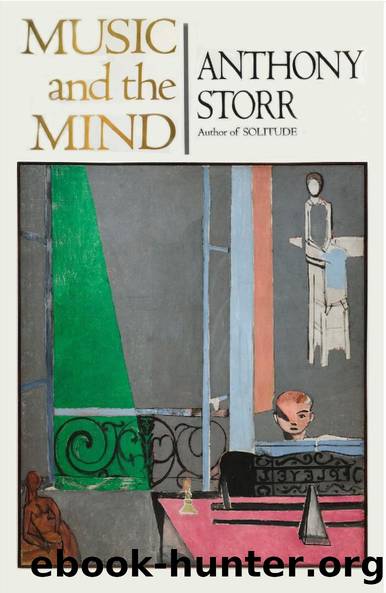Music and The Mind by Anthony Storr

Author:Anthony Storr
Language: eng
Format: epub
Publisher: Free Press
* * *
I. This last-named work, originally part of Miroirs, is probably better known in its orchestral version. The title, meaning ‘The Jester’s Serenade’, refers to the Galician practice of including a jester in a nobleman’s household.
CHAPTER VI
THE SOLITARY LISTENER
Human music is the harmony which may be known by any person who turns to contemplation of himself.
GIOSEFFO ZARLINO 1
The solitary listener to music is a modern phenomenon. Music’s original functions of underlining the significance of public events and promoting social solidarity continue to this day. In the home, music can also play some part in enhancing personal relations. Domestic music-making has declined in recent years; but those who still engage in it know that making music together is an irreplaceable way of achieving closeness. The members of a string quartet sometimes develop a special intimacy which they claim is unmatched by any other relationship.
It is true that solo instrumentalists have always existed, and no doubt they find that their daily practice brings them many rewards. But the solitary listener to music depends upon modern technology and is therefore historically a newcomer.
Has music’s function changed because it is no longer necessarily shared? Or does the possibility of experiencing music in solitude simply clarify and underline its effects upon the individual listener?
It can be argued that even at a public concert each member of the audience is isolated. As outlined earlier, the establishment of concerts of instrumental music emphasized the distinction between performer and listener and also made different individual responses to particular pieces of music more likely. But this is not equivalent to being alone. At a public concert, a listener may wish to be separated as much as possible from his neighbours. He may shut his eyes to their reactions; remain unwilling to share his appreciation with others; stay cocooned within his individual seat. But he cannot totally deny the reality that he is attending a public occasion, or abolish the inductive effects of crowd responses.
Very few people are rich enough to emulate Proust, who used to pay a string quartet to play for himself alone; but those who prefer to experience music without the company of other people have access to another resource, established so recently that its impact on musical composition and performance is still in progress and cannot yet be finally assessed. Modern inventions have made it possible for the listener to enjoy music in complete isolation, unaffected by the responses of others, perhaps temporarily unaware of his surroundings, concentrating only on the music that he himself has selected.
Music’s significance for the isolated listener has been greatly increased by modern methods of recording music. No one need go to concerts in order to hear superb performances. Although some musicians deplore the development of high-fidelity reproduction and claim that listening to live performance is the only genuine way to experience music, there is no reason to believe that the radio, the cassette, and the compact disc have diminished the number of live concerts or performances of opera which take place.
Download
This site does not store any files on its server. We only index and link to content provided by other sites. Please contact the content providers to delete copyright contents if any and email us, we'll remove relevant links or contents immediately.
| Biographies | Business |
| History & Criticism | Instruments |
| Musical Genres | Recording & Sound |
| Reference | Songbooks |
| Theory, Composition & Performance |
The Goal (Off-Campus #4) by Elle Kennedy(12433)
Kathy Andrews Collection by Kathy Andrews(10520)
Diary of a Player by Brad Paisley(6866)
What Does This Button Do? by Bruce Dickinson(5527)
Assassin’s Fate by Robin Hobb(5237)
Big Little Lies by Liane Moriarty(4880)
Pale Blue Dot by Carl Sagan(4001)
Sticky Fingers by Joe Hagan(3454)
The Heroin Diaries by Nikki Sixx(2932)
The Death of the Heart by Elizabeth Bowen(2901)
Beneath These Shadows by Meghan March(2718)
The Help by Kathryn Stockett(2704)
Confessions of a Video Vixen by Karrine Steffans(2674)
How Music Works by David Byrne(2525)
Jam by Jam (epub)(2489)
Harry Potter 4 - Harry Potter and The Goblet of Fire by J.K.Rowling(2416)
Strange Fascination: David Bowie: The Definitive Story by David Buckley(2367)
Petty: The Biography by Warren Zanes(2237)
Darker Than the Deepest Sea by Trevor Dann(2206)
